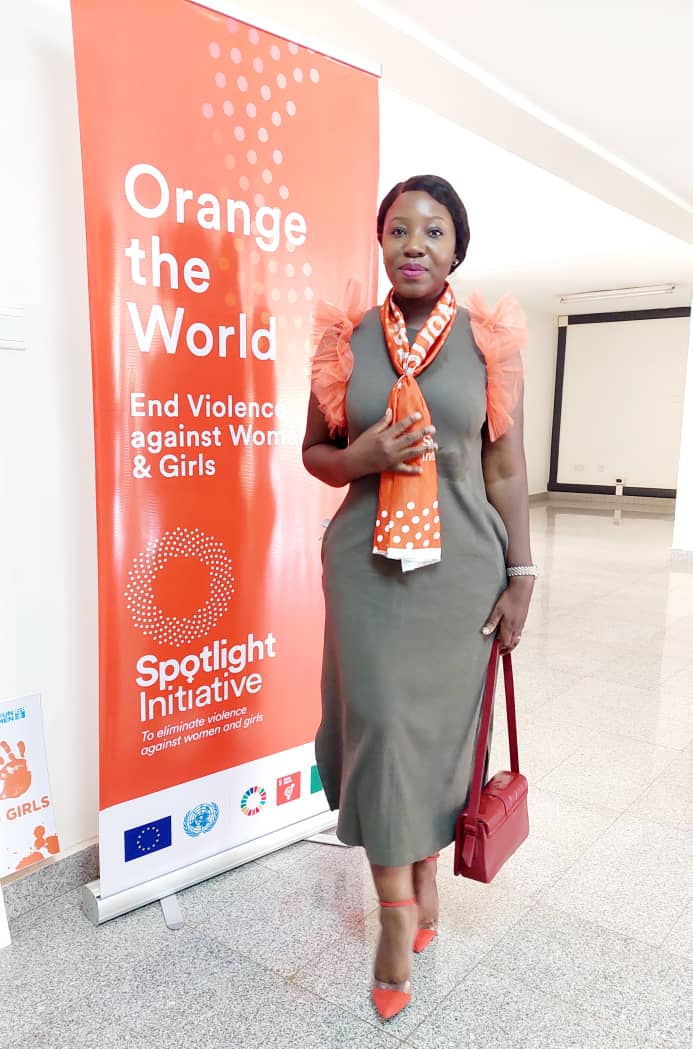Features
Kate Okoh Kpina: Why We Must Take Conversations on Gender-Based Violence Beyond the 16 Days of Activism

Globally, the rights of women is a big issue, especially as we live in a world that works hard to trample those rights. As we prepare to round off the 16 Days of Activism Against Gender-Based Violence, it is important to ensure that conversations around the disparity between the male and female gender, and the cultural and religious practices that are repugnant to natural justice, equity, and good conscience, are not allowed to stop. Gender-based violence against women have been in existence since time memorial, but we have gotten to a point where these issues can no longer be ignored or swept under the rug.
The Problems
In Nigeria, the basic rights of women have suffered a series of abuses because the legal framework that existed did not create equal access to social, economic, political, and cultural rights for both men and women. For instance, CEDAW (Convention on the Elimination of All Forms of Discrimination Against Women), which was ratified without reservations by Nigeria since 1985, is yet to be domesticated. The Gender and Equal Opportunity Bill was also rejected by the National Assembly in 2016, thankfully, it was reintroduced in 2019. The bill seeks to guarantee the rights of women to equal opportunities in employment, equal rights to inheritance for both male and female children, equal rights for women in marriage and divorce, and equal access to education, property/land ownership and inheritance. It also seeks to protect the rights of widows, guarantee appropriate measures against gender discrimination in political and public life, and ensure the prohibition of violence towards women.
The importance of this bill cannot be overemphasized as there are legal, cultural and religious practices that impede on the rights of women in Nigeria.
In the agricultural sector, for example, the land tenure system discriminates against women when it comes to ownership of land and intestacy based on the patriarchal structure in Africa. The customary law on Intestacy in Nigeria recognizes that a woman cannot own property, instead, she is part of the property to be acquired and inherited. In Ogunkoya V. Ogunkoya, the Court of Appeal held that wives are also regarded as chattels, which means they are inheritable by other members of the family of the deceased under certain conditions. Numerous academic authorities also give credence to this position that women do not inherit property because the widow is in fact regarded as part of the estate (acquired by the deceased husband upon payment of her dowry at the time of marriage) to be inherited by the son or relative. As a result, female members of the family under customary law are regarded as mere articles with no right or duties of their own.
Section 55(1)(d) of the Penal Code of Northern Nigeria states that an assault by a man on a woman is not an offense if they are married, as the custom recognizes such “correction” as lawful if there is no grievous bodily injury.
A culture of modern slavery called the ‘Money Woman’ is prevalent in the Becheve tribe, Obanliku LGA of Cross River State where, in exchange for a loan as low as 2,000 naira, families offer up their female child to the creditor for the purpose of child bearing. The creditor is not obligated to take care of the ‘money woman’ and in the event of her death, the debtor is obligated to replace her with another daughter. If the creditor dies, the ‘money woman’ is inherited by the creditor’s next of kin.
There are many more examples of gender-based violence in our society: like the #SexforGrades documentary; in January 2020, the Nigeria Police Force purportedly dismissed a female police officer for getting pregnant out of wedlock; a 2021 Amnesty International’s report, A harrowing Journey, indicated an upsurge of rape cases across Nigeria during the 2020 lockdown.
This diminutive legal status accorded women, the bane of masculine domination prevalent in our cultural norms and religious practices, and weak justice system are amongst others reasons for continuous increase in GBV in Nigeria.
Legal efforts to safeguard the rights of women in Nigeria
Some efforts have been made to protect women’s rights and curb the spike in GBV related cases. For instance, section 42(1) of the Constitution of the Federal Republic of Nigeria, 1999 prohibits discrimination on account of gender.
Interestingly, the Supreme Court of Nigeria reaffirmed this position in 2014 by upholding the unconstitutionality of the discrimination against women in relation to the right to inherit property when Rhodes-Vivour (JSC), in Ukeje v. Ukeje, held that no matter the circumstances of the birth of a female child, such a child is entitled to an inheritance from her late father’s estate. Therefore, the Igbo native law and custom which deprives children born out of wedlock from sharing the benefit of their father’s estate was deemed repugnant to natural justice, equity and good conscience.
In 2003, the Child Rights Act was enacted to protect the rights of children. It prohibits child marriages and provides that anyone who has sexual intercourse with a child is rape, because under the law, a child has no capacity to give consent.
In 2015, the Violence Against Persons Prohibition Act (VAPPA) was enacted and some states have domesticated the act. VAPPA prohibits female genital mutilation, harmful widowhood practices, harmful traditional practices, and all forms of violence against persons in both private and public life. VAPPA expands the definition of rape to include rape against a male or female person.
Further, the Administration of Criminal Justice Act (ACJA) 2015 was enacted to introduce major reforms to the criminal justice system in Nigeria, one of which is the recognition of the rights of women. Prior to the enactment of the ACJA, there was a discriminatory practice adopted over time, not by law but as a matter of convention, excluding women from standing as sureties for the process of granting bail to a suspect. Section 167 (3) ACJA has put an end to this unwritten procedure by recognizing the right of women to stand as surety for a defendant in bail proceedings.
Other notable provisions are sections 189 (g) and 191 ACJA which recognizes the rights of a married woman not only to hold property in her own name, but to also obtain redress or remedies by way of criminal proceedings for the protection and security of her person, and her property.
These provisions encourage gender parity in no small measure at a time where there is increased clamour for it.
The Solution
Victims should be able to access justice in due time. This can be done by ensuring thorough investigations are carried out to obtain verified material evidence using forensic science. This will also enable diligent prosecution and ensure the courts are well disposed to deliver sound judgement. Some states like Lagos, Edo and Ebonyi are establishing special courts to ensure trial of sexual assault cases are dispensed speedily. Other states need to emulate this.
Government should ensure better funding for criminal justice to ensure relevant infrastructure is in place and good renumeration as an incentive to workers. If criminal justice works, the public will have more confidence to report offences, and this will serve as a deterrent to perpetrators.
The family, as the smallest unit of society and the foundation for human learning, should invest more time in bringing up empathetic kids who are humane and compassionate. What people learn in their formative years become a part of them.
Development/donors should be more sincere in their approach. Spend less on conferences and hotel bookings, do more field work to address and engage NGOs to enlighten others and keep advocating against GBV.
Equitable growth is not an abstract notion, it operates in a society devoid of discrimination and is simply one of the many means of achieving sustainable development. The UN has set out the Sustainable Development Goals (SDGs) to meet the needs of the present without compromising the abilities of future generations to meet their own needs. For the SDGs to be achieved, and for men and women to engage in and sustain the development process, there must be equal access to rights. To safeguard women’s rights, archaic practices against women must be expunged, and laws to protect women must be enacted and implemented to the letter.
We must all speak up, act,
Kate Nkechi Okoh
and end the scourge of violence against women!




















